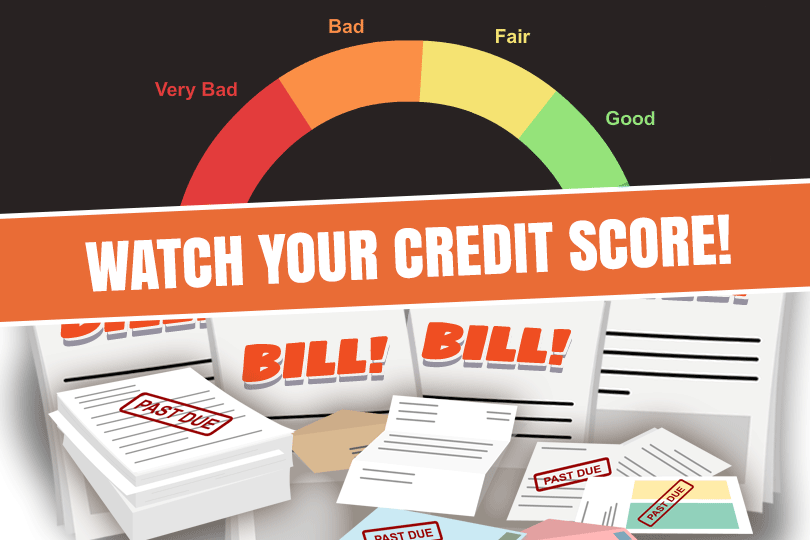What Your Credit Score Says About You
August 23, 2022
What is a Good Credit Score?
Think of your credit score like grades you get in school. A higher grade means that the work you turned in was on time and of higher quality. It measures your academic performance. Your credit score measures your creditworthiness, and you are graded bases on a number of factors, and credit bureaus calculate it on a scale between the range of 300 to 850.
The higher this score is, the more lenders will trust you. A high score represents a borrower who makes repays loans and makes his payments on time, making you less of a risk in the eyes of lenders, giving them more incentive to grant you credit with a lower interest rate.
What Goes into Your Credit Score?
One of the main credit scoring formulas used in the U.S. is the FICO score. All major credit bureaus in the U.S.—Equifax, Experian, and TransUnion—calculate credit scores using FICO's algorithm and information they have collected about people's credit history. It is based on five factors: timely payments (35%), total debt (30%), the age of credit (15%), new credit (10%), and the type of debt (10%). Let’s talk about each of the aspects.
Timely Payments: The first factor is easy enough to understand; to be considered creditworthy, you need to make payments on your loans on time. This can mean making your mortgage payment on time, and even your credit card balance.
Total Debt: Your total debt, which affects 30% of your score, is the amount of money you owe, relative to your credit limits. The more you owe, the riskier it is for you to take on new debt, lowering your credit score.
Age of Credit: Having a longer, more established credit history is advantageous because it gives lenders more information about your spending habits. A longer history of reliable borrowing means your score will be higher.
New Credit: This refers to lines of open credit. If a borrower has opened a number of new credit lines in a short amount of time, it indicates to lenders that they are having financial trouble and cannot manage their money well.
Type of Credit: This is especially helpful for new borrowers who don’t have a long credit history. It helps to have different types of credit lines because it shows lenders that you are able to handle various finances.
While it is good to know what goes into your score, you also need to know what doesn't affect your credit rating. While credit applications can affect the score, "soft" credit checks do not. The score is not based on sex, race, marital status, religion, nationality, or age. Information about where you live, your job, salary, or the interest rates on your credit accounts is not factored into the score either.
------------------------------
RELATED VIDEOS:
You're Almost There When You Get Your Loan Approval
Learn About the Mortgage Insurance Premium (MIP)
Pre-approval Starts the Mortgage Process

FHA Loan Articles
November 21, 2024The dream of homeownership is with some from a young age. But in an uncertain housing market, some grapple with the question: Is buying a home the right move for me?
While renting offers relocation flexibility and lower upfront costs, homeownership provides a wealth of financial and personal benefits.
November 20, 2024Refinancing your mortgage offers a way to cash in on your home equity, potentially reduce your interest rate, or modify your loan term. Borrowers ready to consider have options including FHA loans and conventional loans.
While both provide avenues for refinancing, each loan type may be best for specific needs and financial circumstances. What are the differences between FHA and conventional refinance options?
November 14, 2024The home you want to buy might seem perfect, or it may have a few flaws that are acceptable in the grand scheme of things. But what about issues you can’t spot just by walking through the property a few times? A home inspection provides an unbiased, expert assessment of the property's condition, uncovering potential issues that might not be noticeable to the untrained observer.
November 12, 2024Escrow is an important feature of most typical FHA loans. An escrow account is a third-party account where borrowers deposit funds designated for property taxes and other uses. Requirements to use escrow accounts typically stems from a need to protect all parties involved in the transaction
November 2, 2024When it’s time to consider buying a home, the Federal Housing Administration (FHA) offers two popular options. One is the traditional FHA purchase loan many use to buy a house in the suburbs. But not everyone wants to buy an existing property. Some want more control over the design and configuration of the home.
The other FHA construction loan option, the one-time close mortgage, comes in here. This option is for those who want to approve floor plans, have a say in the types of materials used to build the home and choose its features.







